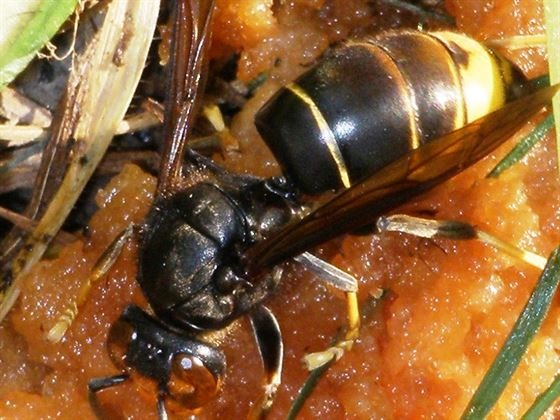The Asian Hornet is here in Dorset as well as other parts of the UK.
Why does this matter? - The Asian Hornet can destroy a hive very quickly.
What do they do? - They hover, called hawking, outside the hive entrance. They will grab a honey bee near the hive. They rip of the wings and eat the body -a useful bag of protein.
How does this affect the hive? - Firstly the Asian Hornet is eating foraging bees. The colony soon becomes aware of this threat and they will not leave the hive. The result is the hive could starve.
But why target bees? - Well a honey bee is a social insect and a colony will have many thousand flying bees. Once an Asian Hornet finds a hive it has found a ready supply of food. Much easier to hawk outside a hive rather than go hunting for solitary bees or bumble bees.
What can we do to stop them? - Learn what an Asian Hornet looks like. Look for them if you are out walking. Some have been spotted by people dog walking and others whilst sitting in the garden.
How do I recognise one? - They are bigger than a wasp but smaller than a European Hornet. They have yellow legs, an orange face and a single yellow band across their abdomen.
And if I see one? - If you have a Smart phone then download the "Asian Hornet Watch App" for iPhone or Android from your usual app store. That has pictures of the Asian Hornet and other insects with which it can be confused.
What else can I do with the app?- If you can get a photo of it then the app can send that off along with your location and time you took the photo. If it confirmed as an Asian Hornet things will happen.
But I don't have a smart phone. Then there is an online reporting tool here.
What things will happen?- DEFRA will be alerted and they will send a team to track down the nest and destroy it. They then analyse the nest to see if it is an isolated nest or one of several in the area.
Is the Asian Hornet dangerous to humans? - Like many insects their aim is to survive and they only get aggressive if you are threatening them or their nest. They are bigger than bees or wasps so they carry more sting venom. If they are threatened they may group together and attack on you - beware.
What about the nests? - The nest looks like a wasp nest. If you do spot one then make a note of where it is and move away. Report it using the app and let professionals deal with it.
Any other tips? - I have been called out several times to suspected sightings. They often fly too fast to see clearly. Take a video of them flying then go through it frame at a time. That helps.
Can't we just ignore them? No. They will start by killing many of our honey bees and without local honey bees where will you be able to get pure local honey.
But I don't eat honey. - And Asian Hornets don't just eat bees. When they have eaten the bees they will start on other pollinating insects like butterflies - and without pollinating insects our fruit bowl will be a sad place.
Where can I find out more?- Beebase is useful as is the BBKA



